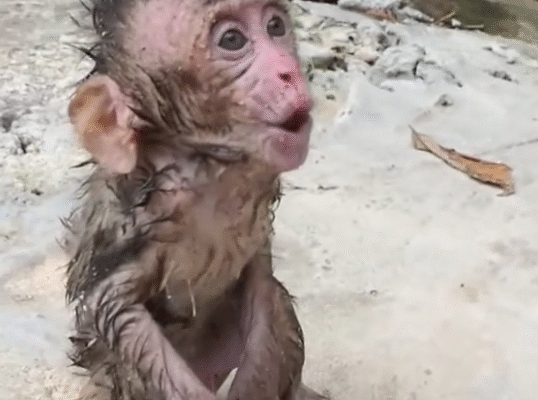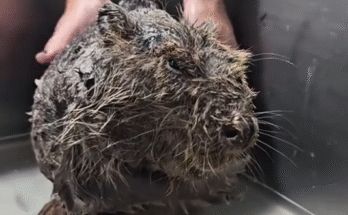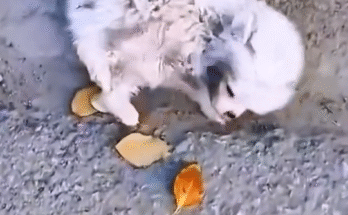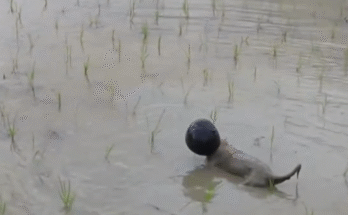In the heart of a small tropical village, nestled deep within a lush forest, lived a mischievous little monkey named Momo. With his bright eyes, quick hands, and a tail that curled like a question mark, Momo was adored by many but known for always finding trouble. Among the villagers, it was common to say, “If there’s chaos in the air, Momo is surely there.”
One warm afternoon, the forest echoed with laughter as Momo darted from tree to tree, leaping and flipping with delight. But this wasn’t just an ordinary day of play. Today, Momo was feeling extra curious. He’d seen a group of children walking toward the river carrying baskets of fruit, and naturally, he decided to follow them.

As the children settled near the riverbank and began washing the fruit, Momo stayed hidden in the trees, watching intently. The fruits looked juicy—mangoes, bananas, and papayas all gleamed in the sunlight. But what caught Momo’s attention even more was the mud near the edge of the river, thick and soft, glistening after the recent rain.
“Hmm,” Momo thought, “what would it feel like to roll in that?”
And that’s exactly what he did.
With a joyful scream, Momo jumped from the tree, landing with a giant SPLASH in the muddy edge of the river. The children gasped in surprise as muddy water sprayed everywhere. Momo didn’t care—he was having the time of his life! He rolled, tumbled, and rubbed mud all over himself from head to toe. His golden-brown fur was now completely hidden beneath a thick coat of dark, squishy muck.
“The monkey is dirty all over!” one child exclaimed, half shocked and half amused.
Momo looked up and grinned, his teeth white and gleaming against the muddy mess. The children began to laugh, some even joining him in the muddy fun. For a few minutes, the riverbank turned into a playground of giggles, splashes, and wild monkey squeals.
But not everyone was pleased.
Nearby, Mama Lin, the village’s fruit vendor and Momo’s occasional caretaker, heard the commotion. She came marching down the trail with her apron flapping and hands on her hips. The moment she saw Momo, her eyes widened in horror.
“Momo! What on earth have you done?” she shouted.
Momo froze mid-splash, his face covered in mud except for one clean eye blinking innocently at Mama Lin. The children stood silently, waiting for what would happen next.
“Momo, you’re filthy! Look at you! The monkey is dirty all over!” she repeated, her voice both angry and worried.
Momo slowly crawled out of the mud pit, dripping and soggy. He tried to smile sweetly, but Mama Lin wasn’t convinced. She grabbed a bucket, filled it with water from the river, and dumped it over his head. Mud cascaded down, but it would take a lot more than one rinse to clean that monkey.
“Well,” Mama Lin sighed, “since you love getting dirty so much, you’re going to love cleaning up too. Come on!”
She marched Momo back to her home, the children trailing behind and chuckling. At her house, she prepared a giant wooden tub, filled it with warm water, and plopped Momo right in. The monkey pouted but didn’t resist. He knew the fun was over—at least for now.
Mama Lin scrubbed behind his ears, under his arms, even between his toes. Bubbles floated through the air, and Momo, despite himself, began to enjoy the bath. His eyes closed, and he let out a soft sigh as warm water soothed his skin and carried away the mud.
“See?” Mama Lin said. “Being clean isn’t so bad, is it?”
After a long soak and several rounds of rinsing, Momo was once again his bright, fluffy self. Mama Lin wrapped him in a towel and sat him on her lap.
“You silly monkey,” she whispered with a smile. “What would I do with you?”
From that day on, the phrase “the monkey is dirty all over” became a village joke. Anytime someone got messy or made a big mistake, they’d laugh and say, “Looks like someone pulled a Momo!”
But of course, Momo wasn’t done with his antics. A week later, he discovered Mama Lin’s spice basket and sneezed his way through a cloud of pepper, turning his face red and his tail twitchy for hours. Another time, he climbed into the bakery’s flour storage and came out looking like a ghost.
Still, no matter how messy or mischievous he got, the villagers loved Momo dearly. He brought joy, laughter, and a little chaos to their quiet lives.
One day, a group of tourists visited the village and stopped by Mama Lin’s fruit stall. While they admired the fresh produce, one of them asked, “Is it true there’s a monkey who acts just like a human here?”
Mama Lin chuckled and pointed to the nearby tree where Momo was swinging lazily. “That’s Momo,” she said proudly. “He’s more human than monkey sometimes. But watch out—he’s always up to something.”
The tourist watched as Momo swung down, plucked a banana, and peeled it like an expert. Just as he was about to eat it, he looked at the tourist, smirked, and rubbed the banana along the man’s shirt before tossing the peel behind him and running off.
Gasps and laughter filled the market.
“Momo!” Mama Lin called. But it was too late—he had already disappeared into the trees.
The tourist laughed, brushing banana mush off his shirt. “Well, I guess that’s what I get for expecting a clean welcome.”
“Never expect clean when Momo’s around,” Mama Lin said, shaking her head. “If you do, you’ll learn what we’ve all learned—the monkey is dirty all over.”
Over time, Momo grew older but never lost his mischievous spirit. His adventures became legendary, told by villagers around fires and to visitors from afar. And whenever someone asked why everyone loved a monkey who caused so much mess, Mama Lin would say with a warm smile:
“Because even when he’s covered in mud or flour or banana goo, he reminds us to laugh, to live, and not take life too seriously.”
And so, the legacy of the dirty little monkey lived on—not just in the stains he left behind, but in the joy he brought to everyone who crossed his path.



